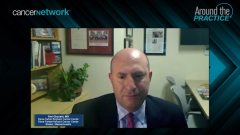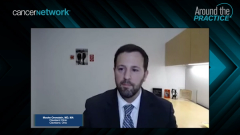
Clinical Trials of Second-Line Treatment for Advanced RCC
Dr Braun closes out the clinical trial dialogue by discussing the CONTACT-03 and Tivo-3 trials.
Episodes in this series

Toni Choueiri, MD: Dr. Braun, we're going to leave the result of the other trials for you that are here. Two options of two approved treatment, essentially post-TKI failure, although some of these treatment- some of these trials involved prior IO, for you to tell us about. The combo of Len-Everolimus is approved as well as Tivozanib. So, tell us a bit about Len-Everolimus trial, randomized phase two, in a minute. And whether there is a starting dose for Lenvatinib for you whether it's 18 or 14 milligrams. Dr. Braun?
David A. Braun, MD, PhD: Yes, absolutely. So, the data really comes from a randomized phase two, Lenvatinib versus the Lenvatinib with Everolimus versus Everolimus where this really seems to be, again, such an enormous trial. It's hard to look at things like overall survival. But we will look at metrics like response, it really seems to be a benefit in favor of Lenvatinib plus Everolimus. And I think one question has always been, what is the dosage start at? It's standard certain goes to one evaluate that trial was 18 milligrams of that Lenvatinib, with five milligrams of Everolimus daily. And that could be a lot for a lot of patients. The majority of patients actually often need a dose reduction, slightly over half the dose reductions of the Lenvatinib. And the natural question is maybe you should just start lower. Think about starting Lenvatinib at 14 milligrams. And so, there's been really, really nice work done by Dr. Paul and Dr. Bergerro as well that really evaluated this question. That OK. If we start with 14 milligrams of Lenvatinib plus Everolimus versus 18 milligrams of current standard of Lenvatinib plus Everolimus, are there differences in terms of quality of life, health related quality of life, or in terms of efficacy? And maybe going in naively, I'd expect, OK. Higher doses of Lenvatinib. Maybe you're going to get a little more efficacy but you're going to sacrifice quality of life". And I have to say, in a positive way, I was surprised by the results that may be as expected numerically, not enormous trial but at least numerically, look like there was a tendency for the 18 milligrams of Lenvatinib to be slightly more efficacious cautioning against small numbers. But I think the thing that was surprising was that in terms of health-related quality of life, in terms of how patients felt, they certainly weren't better. If anything was slightly worse, the 14 milligrams of Lenvatinib. And I think that's something our discusses mentioned earlier that a big part of what goes into quality of life is tumor control. If you have good tumor control, that goes a long way towards improving quality of life. It's not all about the drug toxicity. And so with that in mind, I think this really bolsters the idea of what our discussions had mentioned earlier which is starting off in the approved dose for most patients. There's going to be exceptions but for most patients, Lenvatinib 80 milligrams plus Everolimus, five milligrams. And starting at that dosing, it's the most efficacious dose, it's associated with the best health-related quality of life. But again, not being shy about if needed, reducing the dose for those patients for toxicity.
Toni Choueiri, MD: That's great. And before moving to TIVO, one of the reasons we didn't put Lenvatinib, Everolimus here, not because it's not an option because it is a perhaps an option. But remember, this patient progression was on a Nivo/Ipi while the Len/Everolimus trial had patient that tumor progress on prior Sunitinib. But I want to take this opportunity before jumping to Tivozanib and continuing Dr. Braun here is to welcome several folks tuning in here. Dr. David Rosic here from oncology, hematology care, and the US oncology network, as well as my good friend, Dr. Bob Alter from New Jersey here that mentioned the Len/Everolimus as an option. So welcome. I hope you're enjoying this program. Dr. Braun, back to you. Tivozanib is one of the newest single-agent kids on the block. Describe us TIVO-3 three and where would you use yourself Tivozanib usually in your practice?
David A. Braun, MD, PhD: Yes, absolutely. So Tivozanib or TIVO-3 was really the trial that has led ultimately to the approval of Tivozanib as you say. I think a fairly long road and it was a phase three trial, randomized trial comparing Tivozanib NAB which again is a specific inhibitor, a TKI. But a pretty specific inhibitor of VEGF are the various VEGF receptors so think of it as analogous to Axitinib. The difference is it has a much longer half-life than Axitinib. It has this much more akin to Cabozantinib. And so, while it's targeted the same, its pharmacokinetics are different and that might play a role when we think about some of the toxicities as well. It was compared to the phase three trial against Sorafenib which is truthy, probably not as frequently used the TKI though historically, is has been one that's certainly been used for kidney cancer. It's obviously has a much broader range of targets beyond VEGFR. And in this, in this show, there's again, superiority attributed to Tivozanib. Now, I think for these trials, I think it's important to remember it was done in a really refractory, heavily treatment-refractory setting. So really, not even the second-line setting, lead the third line setting relative- There's some patients that got IO. Often it was a single agent IO second line, but this was a heavily treatment-refractory third line population where they compared Sorafenib to Tivozanib. And I think Tivozanib did outperform it in terms of things like response and progression-free survival. At that point, it's sometimes hard to measure things like overall survival when it's such later lines of therapy. But certainly, at least in terms of response metrics, they seem to really be a benefit for each of those. And so how do I think about integrating them into my practice? One is, as was mentioned earlier, in the context of clinical trials, I think things like TIVO-2 sort of exploring the idea of TKI plus versus IO/TKI in this refractory setting is really an important question. That retrospective data and very small prospective data brought up this hypothesis but needs to be formally tested. The other is when I think about quality of life and the way I think about side effects and particularly how patients have done on prior TKIs, I think Tivozanib has some benefits in terms of its side effect profile. Things like hand-foot syndrome seem to be at a lower rate with Tivozanib compared to others. Its overall tolerability seems to be one of the upsides of this particular VEGF-TKI. And so particularly for patients who have had a difficult time with prior TKIs but otherwise are still interested in a warrant more therapy. This is something I'll consider in using those later lines of therapy.
Toni Choueiri, MD: I think this is perfect, very comprehensive answer.
This transcript has been edited for clarity.
Newsletter
Stay up to date on recent advances in the multidisciplinary approach to cancer.









































